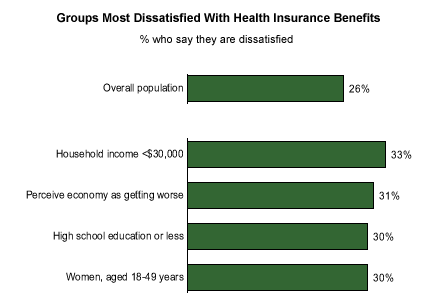An August 2002 Gallup Poll* found that 26% of full- and part-time U.S. employees are dissatisfied with their health insurance benefits. Of 17 workplace attributes examined, satisfaction with health insurance benefits ranked 13th, with only 36% of respondents completely satisfied.
Low ratings of employee health insurance benefits are not surprising in today's environment. Faced with reduced profit margins and premiums that have been rising more rapidly than inflation, many employers have targeted health insurance for cost cutting. That's one reason access to affordable healthcare has become such a major public policy concern.
A Competitive Model of Healthcare
One approach to controlling healthcare costs embraces a competitive model based on free- market economics. This model posits that in a competitive market, knowledgeable consumers who are responsible for shouldering the burden of their own healthcare costs will make rational decisions and select the least expensive options. Thus, competition will control the costs of services.
The competitive model assumes two things about consumers: they are a) knowledgeable and b) price-sensitive. Pursuit of these conditions was a factor in making healthcare advertising, including ads for prescription drugs, legal in the 1980s. The theory was that if consumers are informed about various healthcare options through advertising, perhaps they will be encouraged to shop around for the best products at the lowest prices. Today, the public is inundated with mass media advertising for health-related products and services.
But educating the consumer through advertising has not proven to be a solution to the problem of rising healthcare costs. In fact, advertising is often pointed to as another source of healthcare expense; as Kate Thursby noted in a recent ethics forum in the American Medical News, patients tend to demand the latest tests or procedures from their doctors, even if they are unnecessary, because of information they've seen or read about on television or in newspapers.
Why has creating a more knowledgeable consumer failed to help reduce healthcare costs? Partly because many of those covered by insurance perceive healthcare services as "free goods" -- they bear little or no financial burden for them, and therefore added knowledge does not translate to price sensitivity. Thus there is little incentive for them to consider cost when using healthcare services.
From the perspective of the competitive model, dissatisfaction with health insurance benefits might not be a bad thing for controlling healthcare costs. Dissatisfaction based upon the increased cost of insurance premiums, deductibles or co-pays could influence consumers to be more selective and efficient users of healthcare services. More rational consumption of such services could vastly reduce costs that result from uninformed or gratuitous use.
Who Is Dissatisfied With Health Insurance Benefits?
But while the overall goal of a competitive model of healthcare is desirable, who bears the brunt of dissatisfaction with health insurance? It is instructive to examine which demographic groups are most likely to say they are dissatisfied.

The people most dissatisfied with health insurance benefits include those with relatively low household incomes, those without advanced education, women in childbearing years and those most threatened by the current economy. For example, only 21% of those earning $75,000 or more are dissatisfied with their health insurance benefits, compared to 33% of those earning less than $30,000 per year. Those who are least likely to be able to afford the cost of paying for their own healthcare are also the most likely to be dissatisfied with their employer's health benefits.
Key Points
In theory, dissatisfaction with health insurance benefits is not necessarily a bad thing if it leads to more thrifty use of healthcare industry resources. However, dissatisfaction with health benefits is highest among those least able to afford the cost of healthcare. Studies of healthcare access and health outcomes indicate these groups -- women, low-income families and those with less education -- are among the groups most disadvantaged under the current healthcare delivery system. Because people in these groups tend to have little disposable income, dissatisfaction with healthcare benefits is unlikely to lead them to take on more of the financial burden of healthcare costs. Instead, they may just forego needed healthcare altogether. Is dissatisfaction with health insurance benefits a bad thing? For these people, the answer is a resounding "yes."
*Results are based on telephone interviews with 584 adults, aged 18 and older, employed full or part time, conducted Aug. 5-8, 2002. For results based on the total sample, one can say with 95% confidence that the maximum margin of sampling error is ±4%.